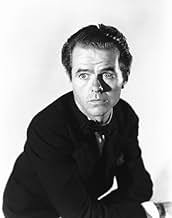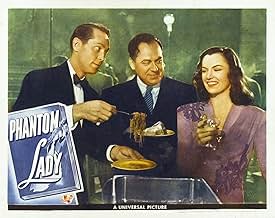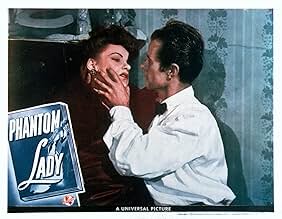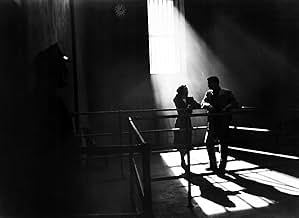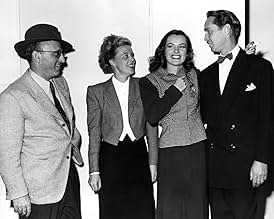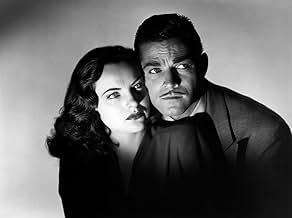IMDb RATING
7.2/10
6.3K
YOUR RATING
A devoted secretary risks her life to try to find the elusive woman who may prove her boss didn't murder his selfish wife.A devoted secretary risks her life to try to find the elusive woman who may prove her boss didn't murder his selfish wife.A devoted secretary risks her life to try to find the elusive woman who may prove her boss didn't murder his selfish wife.
- Director
- Writers
- Stars
Aurora Miranda
- Estela Monteiro
- (as Aurora)
Harry Adams
- Courtroom Spectator
- (uncredited)
Robert Bain
- Guitarist
- (uncredited)
Joan Bayley
- Dancer
- (uncredited)
Brandon Beach
- Theatre Party Guest
- (uncredited)
Brooks Benedict
- Theatre Party Guest
- (uncredited)
- Director
- Writers
- All cast & crew
- Production, box office & more at IMDbPro
Featured reviews
This is a strange little movie.......a film noir with some good performances and some not so good. You often see this film on lists of noir classics but it raises the inevitable question....is it a classic or does it have just too many faults to raise it to the level of winners like "DOA", "The Big Sleep" or "Night and the City".
The premise is fairly good. A man can't prove his whereabouts when his wife is murdered and can only describe his alibi as an unknown woman wearing a rather distinctive hat The story follows the hero's secretary and a sympathetic policeman as they try to prove his innocence. Alan Curtis is a disaster as a gloomy, rather unlikeable man who pretty much gives up trying to find the real killer and becomes resigned to his fate. He doesn't put up much of a fight and his attitude doesn't help much. The lovely Ella Raines portrays the secretary who gets herself into some uncomfortable situations, especially with Elisha Cooke Jr as the drummer man with the plan. Plenty has been said about the drumming scene which somehow sneaked by the censors. It has to be seen to be believed.......whew!!
Franchot Tone plays the hero's best friend and I am still trying to figure out if his playing of that part was really good or really bad. The answer is probably "really bad". The role is against type for him and he overdoes it. He does have a great apartment though!
Fay Helm, playing the woman with the hat, is strangely attractive and is just right for the "phantom lady". Thomas Gomez, as the friendly cop, does his usual good job. So is this film worth watching?......yes. It has some plot holes but overall it is enjoyable. Give it a try.
The premise is fairly good. A man can't prove his whereabouts when his wife is murdered and can only describe his alibi as an unknown woman wearing a rather distinctive hat The story follows the hero's secretary and a sympathetic policeman as they try to prove his innocence. Alan Curtis is a disaster as a gloomy, rather unlikeable man who pretty much gives up trying to find the real killer and becomes resigned to his fate. He doesn't put up much of a fight and his attitude doesn't help much. The lovely Ella Raines portrays the secretary who gets herself into some uncomfortable situations, especially with Elisha Cooke Jr as the drummer man with the plan. Plenty has been said about the drumming scene which somehow sneaked by the censors. It has to be seen to be believed.......whew!!
Franchot Tone plays the hero's best friend and I am still trying to figure out if his playing of that part was really good or really bad. The answer is probably "really bad". The role is against type for him and he overdoes it. He does have a great apartment though!
Fay Helm, playing the woman with the hat, is strangely attractive and is just right for the "phantom lady". Thomas Gomez, as the friendly cop, does his usual good job. So is this film worth watching?......yes. It has some plot holes but overall it is enjoyable. Give it a try.
Seldom have my expectations been as often derailed as in The Phantom Lady. The plot--while a bit farfetched--is never boring or predictable. Although it's a smaller film than say, The Maltese Falcon or The Big Sleep, it is immensely satisfying.
Ella Raines is the real stand-out here. Not only is she great to look at (think half-way between Veronica Lake and Lauren Bacall) she also acts circles 'round the two leading men. Luminous, expressive yet subtle, she is perhaps a better actress than those two icons, if slightly less perfect-looking than Lake and a bit less magnetic than Bacall.
Thomas Gomez turns in a surprisingly complex and interesting performance, but don't expect too much from Franchot Tone. Although his acting abilities need no defense, he didn't do much with this role.
Sure, there are plot holes, a couple of contrived turns, and at least two ridiculous performances (Elisha Cook and Aurora Miranda) but all B Noir has its faults, and this one wins by dint of its unpredictability and pacing, and some great cinematography. Oh--and miss Raines.
Ella Raines is the real stand-out here. Not only is she great to look at (think half-way between Veronica Lake and Lauren Bacall) she also acts circles 'round the two leading men. Luminous, expressive yet subtle, she is perhaps a better actress than those two icons, if slightly less perfect-looking than Lake and a bit less magnetic than Bacall.
Thomas Gomez turns in a surprisingly complex and interesting performance, but don't expect too much from Franchot Tone. Although his acting abilities need no defense, he didn't do much with this role.
Sure, there are plot holes, a couple of contrived turns, and at least two ridiculous performances (Elisha Cook and Aurora Miranda) but all B Noir has its faults, and this one wins by dint of its unpredictability and pacing, and some great cinematography. Oh--and miss Raines.
'Phantom Lady' (retitled in my country as 'Witness wanted') is a little gem for anyone who appreciates 1940s film noir. It need not feature any of the big stars (Bogart, Cagney, Laughton, Ladd etc.), because its strengths are its excellent b/w photography and an interesting story that doesn't rely on predictable clichés of the genre.
Scott Henderson (Alan Curtis) is arrested for the murder of his wife. He is completely innocent, since he spent the evening at a theater with an unknown woman he invited after he met her at a bar (yes, his marriage has seen better days). But when asked for an alibi, not only that 'phantom lady' has disappeared, also several witnesses deny to have seen him with her. Thus, he's thrown into jail, and only his secretary (Ella Raines) and inspector Burgess (Thomas Gomez) don't give up the investigation. When Marlow (Franchot Tone), an old friend of Henderson, offers his assistance, the investigation is taking up speed, but meanwhile another witness was murdered. How can they defend Henderson without witnesses?
What I liked especially about 'Phantom Lady' is that there is no actual hero. Henderson is giving up, sits in his prison cell all day and doesn't show any hope. It's almost like he wants to be imprisoned for something he didn't do. So it's really the secretary who becomes the central character, driving the search for the real murderer. Quite unusual for the times and well worth watching.
Scott Henderson (Alan Curtis) is arrested for the murder of his wife. He is completely innocent, since he spent the evening at a theater with an unknown woman he invited after he met her at a bar (yes, his marriage has seen better days). But when asked for an alibi, not only that 'phantom lady' has disappeared, also several witnesses deny to have seen him with her. Thus, he's thrown into jail, and only his secretary (Ella Raines) and inspector Burgess (Thomas Gomez) don't give up the investigation. When Marlow (Franchot Tone), an old friend of Henderson, offers his assistance, the investigation is taking up speed, but meanwhile another witness was murdered. How can they defend Henderson without witnesses?
What I liked especially about 'Phantom Lady' is that there is no actual hero. Henderson is giving up, sits in his prison cell all day and doesn't show any hope. It's almost like he wants to be imprisoned for something he didn't do. So it's really the secretary who becomes the central character, driving the search for the real murderer. Quite unusual for the times and well worth watching.
I found this film noir to be odd in that the beginning and the end were both lousy but the middle part was excellent. The "lousy" parts are such because they drag on and are simply boring when they don't have to be. The immediate opening scenes are fine, showing an innocent man, "Scott Henderson" (Alan Curtis) being charged and found guilty of a murder he didn't commit....but then almost nothing happens for the next 20 minutes.
Then comes the good part when Henderson's secretary "Carol 'Kansas' Richmond" (Ella Raines) gets involved, taking it upon herself to find the missing woman who could prove that her boss was innocent. During her pursuit we meet a couple of very interesting characters and we see some outstanding film-noir photography.
The most interesting character, "Cliff," was played by film noir regular Elisha Cook Jr. He has one scene in which he takes Raines to a local warehouse-type room where his jazz band is practicing. Cook then shows off with this drum playing and it is so frenetic, so bizarre that it is almost shocking to watch. You have to see it, to appreciate it. It's a small, insignificant scene but very memorable. A few other minor characters are a bit strange, too.
Thomas Gomez plays a cop ("Inspector Burgess") who winds up helping Raines a bit, and he's good to watch, too.In the end, Raines discovers what's up and is in peril herself. That scene has suspense but is too drawn out. It's like, "okay, already.....let's go on with it!"
Then comes the good part when Henderson's secretary "Carol 'Kansas' Richmond" (Ella Raines) gets involved, taking it upon herself to find the missing woman who could prove that her boss was innocent. During her pursuit we meet a couple of very interesting characters and we see some outstanding film-noir photography.
The most interesting character, "Cliff," was played by film noir regular Elisha Cook Jr. He has one scene in which he takes Raines to a local warehouse-type room where his jazz band is practicing. Cook then shows off with this drum playing and it is so frenetic, so bizarre that it is almost shocking to watch. You have to see it, to appreciate it. It's a small, insignificant scene but very memorable. A few other minor characters are a bit strange, too.
Thomas Gomez plays a cop ("Inspector Burgess") who winds up helping Raines a bit, and he's good to watch, too.In the end, Raines discovers what's up and is in peril herself. That scene has suspense but is too drawn out. It's like, "okay, already.....let's go on with it!"
Phantom Lady is quintessential Film Noir and a must-see for anyone who appreciates the genre. The film is not, nor does it aspire to be, a whodunit with an airtight plot, or a mystery-thriller that ends with an inconceivable twist as in the original novel. If that is what you want or expect, this is probably not your cup of tea. Although many great films considered part of the noir genre may include some of these elements, that's not what film noir is all about.
Film Noir is almost synonymous with Cornell Woolrich (William Irish), the author of the novel Phantom Lady. His novels and short stories are the source of an amazing number of screenplays and teleplays, including several noir and non-noir classics such as Hitchcock's Rear Window.
As a writer and persona, Woolrich was a uniquely noirish sort of guy. In fact, he wrote a series of six "Black" novels, all have been adapted to the screen or TV at least once, and some multiple times. Obviously, noir means black, and these black novels inspire great noir films.
Many Woolrich stories, Phantom Lady is one, revolve around impossible crimes. As sinister forces close in, his protagonists are powerless do anything but follow some diabolical labyrinth that defies understanding. No wonder his work is a perfect fit for film noir, which takes place in its own dark universe, where characters struggle against powerful and malevolent forces. Unfortunately, the nightmare scenarios created by Woolrich, enhanced by his own inimitable style of description, often seem to get lost in translation when brought to the silver screen. Although most of the films are very good, these adaptations tend to be very different from their literary source.
Not so with Phantom Lady – up to a point. Although details may vary, director Robert Siodmak cleverly and adroitly uses dazzling Expressionist visuals and quirky character performances to emulate the dreamlike quality of a Woolrich story. A good example is the incredible scene where Elisha Cook Jr. drums up the sexual overtones for Ella Raines.
Since our psychotic mastermind is revealed early on, there is no who-done-it mystery to distract the audience. The revelation allows a brilliant means of reworking the story into a tight and infinitely more interesting screenplay. Woolrich's original story follows a different approach, not confirming the killer until the end. Obviously, some treatments work better as a novel than a movie.
Often over-shadowed in the movies which he appears, this time Franchot Tone fits so perfectly into the role of Jack Marlow that we are captivated by his machinations, wondering where it will all end. All of the other characters are great and true to form as well. Raines is exceptionally strong in her portrayal of the somewhat naive love-struck secretary who won't give up.
True to a Woolrich novel, the genius of the film is in the telling of the story; more important than structure or even the ending. Although the outcome is the same, the ending is much different in the novel. Also, after the killer is revealed in the original story, there are 16 long pages, explaining every detail of every plot twist. Unfortunately, this approach is anticlimactic, and would never work as a film. Nevertheless, Siodmak is able to present a more convincing story with almost no explanation.
Any screen adaptation of a Woolrich story is always in jeopardy of being swallowed up by massive plot holes. After all, part of the charm of a Cornell Woolrich story is that you never really know if you dealing with reality, or trapped in a drug and alcohol induced nightmare.
In Phantom Lady, a character reveals, " I'd been blazing a reefer already before it happened, and you know what that does to you." Woolrich certainly did know, and much of his literature is obviously inspired by mind-bending experiences. If a screenwriter and director can artfully breach the massive plot chasms of an original Woolrich story, yet still preserve the beauty as in Phantom Lady, the film becomes a feast for any Film Noir fanatic.
Film Noir is almost synonymous with Cornell Woolrich (William Irish), the author of the novel Phantom Lady. His novels and short stories are the source of an amazing number of screenplays and teleplays, including several noir and non-noir classics such as Hitchcock's Rear Window.
As a writer and persona, Woolrich was a uniquely noirish sort of guy. In fact, he wrote a series of six "Black" novels, all have been adapted to the screen or TV at least once, and some multiple times. Obviously, noir means black, and these black novels inspire great noir films.
Many Woolrich stories, Phantom Lady is one, revolve around impossible crimes. As sinister forces close in, his protagonists are powerless do anything but follow some diabolical labyrinth that defies understanding. No wonder his work is a perfect fit for film noir, which takes place in its own dark universe, where characters struggle against powerful and malevolent forces. Unfortunately, the nightmare scenarios created by Woolrich, enhanced by his own inimitable style of description, often seem to get lost in translation when brought to the silver screen. Although most of the films are very good, these adaptations tend to be very different from their literary source.
Not so with Phantom Lady – up to a point. Although details may vary, director Robert Siodmak cleverly and adroitly uses dazzling Expressionist visuals and quirky character performances to emulate the dreamlike quality of a Woolrich story. A good example is the incredible scene where Elisha Cook Jr. drums up the sexual overtones for Ella Raines.
Since our psychotic mastermind is revealed early on, there is no who-done-it mystery to distract the audience. The revelation allows a brilliant means of reworking the story into a tight and infinitely more interesting screenplay. Woolrich's original story follows a different approach, not confirming the killer until the end. Obviously, some treatments work better as a novel than a movie.
Often over-shadowed in the movies which he appears, this time Franchot Tone fits so perfectly into the role of Jack Marlow that we are captivated by his machinations, wondering where it will all end. All of the other characters are great and true to form as well. Raines is exceptionally strong in her portrayal of the somewhat naive love-struck secretary who won't give up.
True to a Woolrich novel, the genius of the film is in the telling of the story; more important than structure or even the ending. Although the outcome is the same, the ending is much different in the novel. Also, after the killer is revealed in the original story, there are 16 long pages, explaining every detail of every plot twist. Unfortunately, this approach is anticlimactic, and would never work as a film. Nevertheless, Siodmak is able to present a more convincing story with almost no explanation.
Any screen adaptation of a Woolrich story is always in jeopardy of being swallowed up by massive plot holes. After all, part of the charm of a Cornell Woolrich story is that you never really know if you dealing with reality, or trapped in a drug and alcohol induced nightmare.
In Phantom Lady, a character reveals, " I'd been blazing a reefer already before it happened, and you know what that does to you." Woolrich certainly did know, and much of his literature is obviously inspired by mind-bending experiences. If a screenwriter and director can artfully breach the massive plot chasms of an original Woolrich story, yet still preserve the beauty as in Phantom Lady, the film becomes a feast for any Film Noir fanatic.
Did you know
- TriviaThe elusive phantom lady being sought by Carol "Kansas" Richman (Ella Raines), is repeatedly referenced as "Miss Terry" (i.e., "mystery").
- GoofsCliff's (Elisha Cook Jr.) "drumming" at no time matches the drums on the soundtrack.
- Quotes
Cliff: You and I are going to have fun tonight, Jeannie! You like jive?
Carol Richman: You bet! I'm a hep kitten!
- ConnectionsFeatured in Les Experts: A Night at the Movies (2003)
- SoundtracksI'll Remember April
(uncredited)
Music by Gene de Paul
Lyrics by Patricia Johnston & Don Raye
[played during opening credits and throughout the movie]
- How long is Phantom Lady?Powered by Alexa
Details
- Runtime
- 1h 27m(87 min)
- Color
- Aspect ratio
- 1.33 : 1
Contribute to this page
Suggest an edit or add missing content


